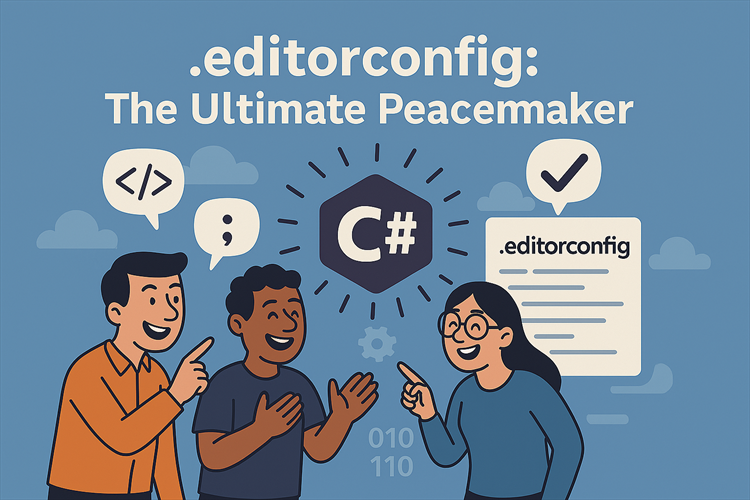
Best Practices for C# Code Formatting with .editorconfig
🧩 The Problem: Inconsistent Code in Team Environments
If you've worked on a C# project with a team—even a small one—you’ve likely seen this:
-
Mixed indentation (tabs vs. spaces)
-
Differing
usingdirective orders -
Conflicting code styles (var vs explicit types)
-
Unclear naming conventions
-
PR comments nitpicking formatting instead of logic
None of these issues break your code, but they slow you down, clutter diffs, and waste time in code reviews. When developers spend more time debating brace styles or whether _myField or myField is correct, they're not focusing on what matters: writing great software.
🛠️ The Solution: Standardized Code with .editorconfig
This is where .editorconfig comes in.
.editorconfig is a cross-editor, cross-tool configuration file that enforces consistent coding styles. With the right setup, your IDE (like Visual Studio or Rider) and analyzers (like Roslyn) automatically apply and suggest the correct style without manual effort.
Below is a battle-tested .editorconfig designed for ASP.NET Core C# projects, optimized for team collaboration, clean diffs, and maintainability.
📋 What This .editorconfig Does
✅ Clean and Readable Code
-
4-space indentation and no tabs
-
No trailing whitespace, and final newline in every file
-
Windows line endings (CRLF) to avoid issues on shared repos
✅ Consistent Names and Modifiers
-
Enforces
_camelCaseforprivate readonlyfields -
Requires explicit access modifiers (
public,private, etc.)
✅ Logical Using Statements
-
System usings first, grouped by blank lines
-
Outside of namespaces for clarity
-
Encourages simplified
usingstatements (C# 8+)
✅ Modern, Clean Syntax
-
Prefers:
-
varwhere type is obvious or built-in -
Coalesce expressions (
??) and null propagation (?.) -
Object and collection initializers
-
Expression-bodied properties and accessors
-
✅ Minimal Boilerplate
-
Supports file-scoped namespaces
-
Encourages top-level statements (C# 9+) and primary constructors (C# 12)
✅ Editor Support and Enforcement
-
Works with Visual Studio, JetBrains Rider, VS Code (with C# plugin)
-
Can be backed by Roslyn analyzers to fail builds on violations if needed
🚀 Why This Is the Best Solution for Teams
| Benefit | Description |
|---|---|
| 🔁 Reduced Review Time | Developers stop commenting on formatting issues and focus on business logic. |
| 🧠 Lower Cognitive Load | Everyone writes and sees code in the same format, making code easier to read and understand. |
| 🔍 Cleaner Diffs | Consistent styles mean diffs only reflect logic changes, not formatting noise. |
| 💻 Onboarding Is Easier | New developers get up to speed faster when styles are standardized and IDEs auto-format for them. |
| 📦 Tooling Integration | Plays well with dotnet format, CI pipelines, and build validation tools. |
🏁 Conclusion: Adopt and Enforce .editorconfig Early
Don’t wait for your codebase to become a mess of mismatched styles. By defining a shared .editorconfig, you:
-
Prevent style drift
-
Increase code quality
-
Foster a professional engineering culture
This is one of those low-effort, high-impact investments you can make for your team today. Start with the config above, tweak to your needs, and enjoy smoother development and cleaner collaboration.
Download .editorconfig file from my Git Account and past in your project at root folder.
Thanks, for reading the blog, I hope it helps you. Please share this link on your social media accounts so that others can read our valuable content. Share your queries with our expert team and get Free Expert Advice for Your Business today.
